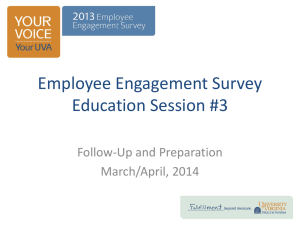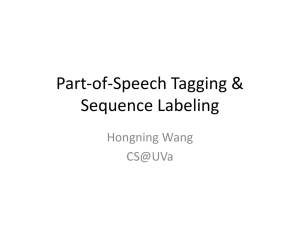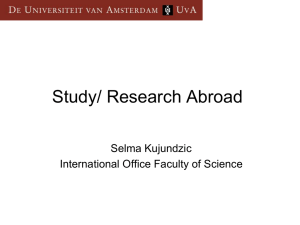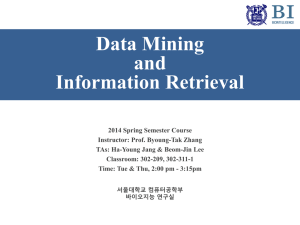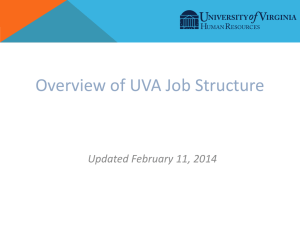Slides - University of Virginia
advertisement
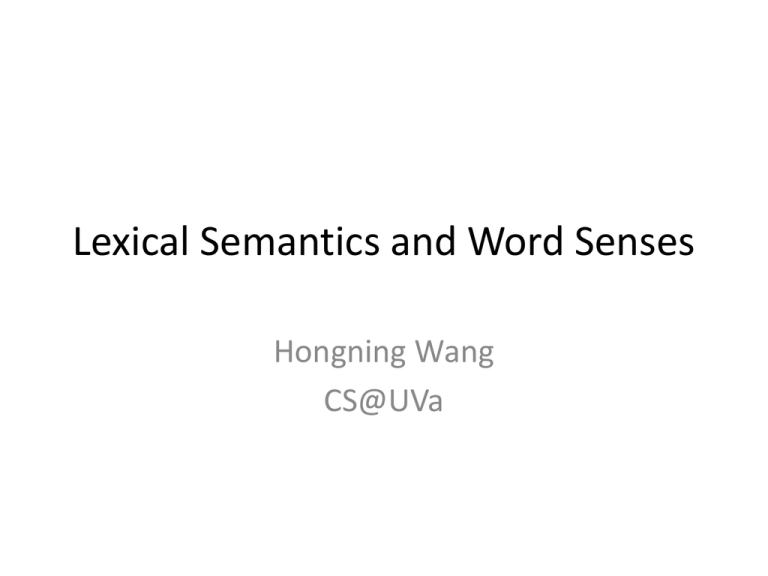
Lexical Semantics and Word Senses
Hongning Wang
CS@UVa
Today’s lecture
1. Lexical semantics
– Meaning of words
– Relation between different meanings
2. WordNet
– An ontology structure of word senses
– Similarity between words
3. Distributional semantics
– Similarity between words
– Word sense disambiguation
CS@UVa
CS 6501: Text Mining
2
What is the meaning of a word?
• Most words have many different senses
– dog = animal or sausage?
– lie = to be in a horizontal position or a false statement
made with deliberate intent
• What are the relations of different words in terms
of meaning?
– Specific relations between senses
• Animal is more general than dog
– Semantic fields
• Money is related to bank
CS@UVa
“a set of words grouped, referring to a
specific subject … not necessarily
synonymous, but are all used to talk about
the same general phenomenon ” - wiki
CS 6501: Text Mining
3
Word senses
• What does ‘bank’ mean?
– A financial institution
• E.g., “US bank has raised interest rates.”
– A particular branch of a financial institution
• E.g., “The bank on Main Street closes at 5pm.”
– The sloping side of any hollow in the ground, espe
cially when bordering a river
• E.g., “In 1927, the bank of the Mississippi flooded.”
– A ‘repository’
• E.g., “I donate blood to a blood bank.”
CS@UVa
CS 6501: Text Mining
4
Lexicon entries
lemma
senses
CS@UVa
CS 6501: Text Mining
5
Some terminologies
• Word forms: runs, ran, running; good, better, best
– Any, possibly inflected, form of a word
• Lemma (citation/dictionary form): run; good
– A basic word form (e.g. infinitive or singular nominative
noun) that is used to represent all forms of the same word
• Lexeme: RUN(V), GOOD(A), BANK1(N), BANK2(N)
– An abstract representation of a word (and all its forms),
with a part-of-speech and a set of related word senses
– Often just written (or referred to) as the lemma, perhaps
in a different FONT
• Lexicon
– A (finite) list of lexemes
CS@UVa
CS 6501: Text Mining
6
Make sense of word senses
• Polysemy
– A lexeme is polysemous if it has different related
senses
bank = financial institution
CS@UVa
CS 6501: Text Mining
or
a building
7
Make sense of word senses
• Homonyms
– Two lexemes are homonyms if their senses are
unrelated, but they happen to have the same
spelling and pronunciation
bank = financial institution
CS@UVa
CS 6501: Text Mining
or
river bank
8
Relations between senses
• Symmetric relations
– Synonyms: couch/sofa
• Two lemmas with the same sense
– Antonyms: cold/hot, rise/fall, in/out
• Two lemmas with the opposite sense
• Hierarchical relations:
– Hypernyms and hyponyms: pet/dog
• The hyponym (dog) is more specific than the hypernym (pet)
– Holonyms and meronyms: car/wheel
• The meronym (wheel) is a part of the holonym (car)
CS@UVa
CS 6501: Text Mining
9
WordNet
George Miller, Cognitive
Science Laboratory of Princeton
University, 1985
• A very large lexical database of English:
– 117K nouns, 11K verbs, 22K adjectives, 4.5K adverbs
• Word senses grouped into synonym sets
(“synsets”) linked into a conceptual-semantic
hierarchy
– 82K noun synsets, 13K verb synsets, 18K adjectives
synsets, 3.6K adverb synsets
– Avg. # of senses: 1.23/noun, 2.16/verb, 1.41/adj,
1.24/adverb
• Conceptual-semantic relations
– hypernym/hyponym
CS@UVa
CS 6501: Text Mining
10
A WordNet example
• http://wordnet.princeton.edu/
CS@UVa
CS 6501: Text Mining
11
Hierarchical synset relations: nouns
• Hypernym/hyponym (between concepts)
– The more general ‘meal’ is a hypernym of the more specific
‘breakfast’
• Instance hypernym/hyponym (between concepts and
instances)
Jane Austen, 1775–1817, English novelist
– Austen is an instance hyponym of author
• Member holonym/meronym (groups and members)
– professor is a member meronym of (a university’s) faculty
• Part holonym/meronym (wholes and parts)
– wheel is a part meronym of (is a part of) car.
• Substance meronym/holonym (substances and
components)
– flour is a substance meronym of (is made of) bread
CS@UVa
CS 6501: Text Mining
12
WordNet hypernyms & hyponyms
CS@UVa
CS 6501: Text Mining
13
Hierarchical synset relations: verbs
the presence of a ‘manner’
relation between two lexemes
• Hypernym/troponym (between events)
– travel/fly, walk/stroll
– Flying is a troponym of traveling: it denotes a
specific manner of traveling
• Entailment (between events):
– snore/sleep
• Snoring entails (presupposes) sleeping
CS@UVa
CS 6501: Text Mining
14
WordNet similarity
• Path based similarity measure between words
– Shortest path between two concepts (Leacock &
Chodorow 1998)
• sim = 1/|shortest path|
– Path length to the root node from the least
common subsumer (LCS) of the two concepts (Wu
the most specific concept which
& Palmer 1994)
is an ancestor of both A and B.
• sim = 2*depth(LCS)/(depth(w1)+depth(w2))
• http://wn-similarity.sourceforge.net/
CS@UVa
CS 6501: Text Mining
15
WordNet::Similarity
CS@UVa
CS 6501: Text Mining
16
WordNet::Similarity
CS@UVa
CS 6501: Text Mining
17
Distributional hypothesis
• What is tezgüino?
– A bottle of tezgüino is on the table.
– Everybody likes tezgüino.
– Tezgüino makes you drunk.
– We make tezgüino out of corn.
• The contexts in which a word appears tell us a
lot about what it means
CS@UVa
CS 6501: Text Mining
18
Recap: Lexical semantics
• Meaning of words
– Within a word
• Polysemy and homonyms
– Between words
• Symmetric relations
– Synonyms and antonyms
• Hierarchical relations
– Hypernyms and hyponyms
– Holonyms and meronyms
CS@UVa
CS 6501: Text Mining
19
Recap: WordNet
• An ontology structure of word senses
– Nodes on the graph: synonym sets
– Conceptual-semantic relations
– Similarity
• Shortest path between two concepts
• Path length to the root node from the least common
subsumer (LCS) of the two concepts
CS@UVa
CS 6501: Text Mining
20
Distributional semantics
• Use the contexts in which words appear to
measure their similarity
– Assumption: similar contexts => similar meanings
– Approach: represent each word 𝑤 as a vector of
its contexts 𝑐
• Vector space representation
• Each dimension corresponds to a particular context 𝑐𝑛
• Each element in the vector of 𝑤 captures the degree to
which the word 𝑤 is associated with the context 𝑐𝑛
– Similarity metric
• Cosine similarity
CS@UVa
CS 6501: Text Mining
21
How to define the contexts
within a sentence
• Nearby words
– 𝑤 appears near 𝑐 if 𝑐 occurs within ±𝑘 words of 𝑤
• It yields fairly broad thematic relations
– Decide on a fixed vocabulary of 𝑁 context words 𝑐1 . . 𝑐𝑁
• Prefer words occur frequently enough in the corpus but not too
frequent (i.e., avoid stopwords)
– Co-occurrence count of word 𝑤 and context 𝑐 as the
corresponding element in the vector
• Pointwise Mutual Information (PMI)
• Grammatical relations
– How often is 𝑤 used as the subject of the verb 𝑐?
– Fine-grained thematic relations
CS@UVa
CS 6501: Text Mining
22
Mutual information
• Relatedness between two random variables
– 𝐼 𝑋; 𝑌 =
CS@UVa
𝑦∈𝑌
𝑝(𝑥,𝑦)
𝑥∈𝑋 𝑝(𝑥, 𝑦) log(𝑝 𝑥 𝑝(𝑦))
CS 6501: Text Mining
23
Pointwise mutual information
within a sentence
• PMI between w and c using a fixed window of
± 𝑘 words
– 𝑃𝑀𝐼 𝑤; 𝑐 =
𝑝(𝑤,𝑐)
𝑝(𝑤, 𝑐) log(
)
𝑝 𝑤 𝑝(𝑐)
How often 𝑤 and 𝑐 cooccur inside a window
CS@UVa
How often 𝑤 occurs How often 𝑐 occurs
CS 6501: Text Mining
24
Word sense disambiguation
• What does this word mean?
– This plant needs to be watered each day.
• living plant
– This plant manufactures 1000 widgets each day.
• factory
• Word sense disambiguation (WSD)
– Identify the sense of content words (noun, verb,
adjective) in context (assuming a fixed inventory
of word senses)
CS@UVa
CS 6501: Text Mining
25
Dictionary-based methods
• A dictionary/thesaurus contains glosses and
examples of a word
bank1
Gloss: a financial institution that accepts deposits and channels
the money into lending activities
Examples: “he cashed the check at the bank”,
“that bank holds the mortgage on my home”
bank2
Gloss: sloping land (especially the slope beside a body of water)
Examples: “they pulled the canoe up on the bank”,
“he sat on the bank of the river and watched the current”
CS@UVa
CS 6501: Text Mining
26
Lesk algorithm
• Compare the context with the dictionary
definition of the sense
context words
– Construct the signature of a word in context by the
signatures of its senses in the dictionary
• Signature = set of context words (in examples/gloss or in
context)
– Assign the dictionary sense whose gloss and examples
are the most similar to the context in which the word
occurs
• Similarity = size of intersection of context signature and
sense signature
CS@UVa
CS 6501: Text Mining
27
Sense signatures
bank1
Gloss: a financial institution that accepts deposits and channels
the money into lending activities
Examples: “he cashed the check at the bank”,
“that bank holds the mortgage on my home”
Signature(bank1) = {financial, institution, accept, deposit,
channel, money, lend, activity, cash, check, hold, mortgage, home}
bank2
Gloss: sloping land (especially the slope beside a body of water)
Examples: “they pulled the canoe up on the bank”,
“he sat on the bank of the river and watched the current”
Signature(bank1) = {slope, land, body, water, pull, canoe, sit,
river, watch, current}
CS@UVa
CS 6501: Text Mining
28
Signature of target word
“The bank refused to give me a loan.”
• Simplified Lesk
– Words in context
– Signature(bank) = {refuse, give, loan}
• Original Lesk
– Augmented signature of the target word
– Signature(bank) = {refuse, reject, request,... , give,
gift, donate,... loan, money, borrow,...}
CS@UVa
CS 6501: Text Mining
29
Learning-based Methods
• Will be discussed in the lecture of “Text
Categorization”
– Basically treat each sense as an independent class
label
– Construct classifiers to assign each instance with
context into the classes/senses
CS@UVa
CS 6501: Text Mining
30
What you should know
• Lexical semantics
– Relationship between words
– WordNet
• Distributional semantics
– Similarity between words
– Word sense disambiguation
CS@UVa
CS 6501: Text Mining
31
Today’s reading
• Speech and Language Processing
– Chapter 19: Lexical Semantics
– Chapter 20: Computational Lexical Semantics
CS@UVa
CS 6501: Text Mining
32
